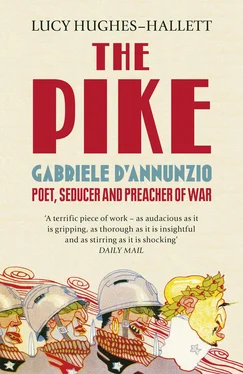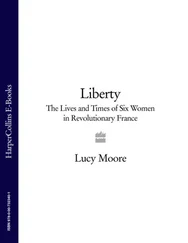1 ...7 8 9 11 12 13 ...39 The aircraft circle round, flying beneath the enemy troops on the high mountain passes and then climbing again ‘up the sides of Mount Hermada like a cart crawling up a slope’. They return to base to load up with more bombs, and fly back into battle over the Austrians’ big guns. ‘We saw shells passing the prow and the stern like ugly big rats tunnelling through the air.’ This is the fiercest fire d’Annunzio has ever yet endured. It is ‘a marvellous hour, which I would not exchange for any other I have lived’.
April 1919. The war is over. The peace-makers are still conferring at Versailles, carving up the remains of the defunct Austro-Hungarian Empire. Ever since the war ended d’Annunzio has been crying out that Italy is being cheated of its fair share, that its victory has been ‘mutilated’. Now he is in Venice, speaking in the Piazza San Marco, calling upon Italians to take up arms again and lay claim to the territory (Istria, Croatia and the Dalmatian coast) which the newborn state of Yugoslavia is claiming, but which he calls ‘Italy’s left lung’. The Irish Italophile Walter Starkie is there and, at first, is horribly disappointed by d’Annunzio’s appearance. ‘A dwarf of a man, goggle-eyed and thick-lipped – truly sinister in his grotesqueness, like a tragic gargoyle.’ Starkie, like many others, wonders incredulously: ‘Is this the man that Duse loved?’
D’Annunzio begins to speak; at once Starkie is ‘fascinated’. D’Annunzio plays on the crowd ‘as a supreme violinist does upon a Stradivarius’. He pretends to be reluctant to speak. ‘The time for words has passed.’ But he has come prepared, bringing with him an enormous Italian flag, which he employs as a prop in a brilliantly manipulative, quasi-liturgical performance. His bearing is priestly, his delivery carefully measured. ‘Never a hurried, jerky gesture: occasionally one arm raised slowly as though wielding an imaginary wand.’ The effect is mesmerising. ‘The tones rose and fell in an unending stream, like the song of a minstrel, and they spread over the vast audience like olive oil on the surface of the sea.’
This oil is designed not to calm troubled waters but to set them surging. Very, very gradually, his voice rising in a patiently extended crescendo, d’Annunzio strings his public’s emotions ever tighter. He incites the crowd to call out in reply to him, involving them in their own bewitchment. His own record of the speech notes their responses. ‘All the people cry out “We want it’’’; ‘the whole piazza resounds to unanimous acclamation’; ‘frenetic cheering’; ‘the people cry “Yes’’’; ‘the people cry “Yes!” again, more loudly’; ‘the people repeat the shout and brandish their flags’. As he reaches his thundering climax, writes Starkie, ‘the eyes of the thousands [are] fixed upon him as though hypnotised by his power’.
September 1919. D’Annunzio has taken action. He has marched into Fiume and made himself ruler of the tiny but now world-famous city-state. Among his new acolytes is Giovanni Comisso, another poet (some thirty years younger than d’Annunzio), who was serving with the Allied garrison when d’Annunzio marched into the city, and who promptly deserted to join him.
Comisso is there when d’Annunzio arrives at the Governor’s Palace amid a din of bands playing and crowds singing. Stepping out of the car he looks small and, feverish as he is, ‘very, very weak’. Comisso joins the throng who jostle along behind d’Annunzio up the marble staircase to the wide balcony from which he is to address the people massed below. To Comisso’s wonder the frail invalid begins to speak ‘with incredible force’, declaring that Fiume is the only brightness in a mad, vile world. The assembled crowd weep and laugh and howl out their enthusiasm. ‘This man convinced me,’ writes Comisso ‘as though he was one of the prophets of olden times.’
A few days later Comisso is shaving when he hears a hubbub outside his window and leans out, his shirt open, his face covered with soap, to see what’s causing the commotion. Down in the street soldiers are milling around a very small man wearing the jaunty-brimmed felt hat of the Alpine troops. ‘He seemed like a boy, agile and restless. He kept taking one of the others by the arm and having himself photographed.’ It is d’Annunzio, turning some of his prodigious energy to the job he does so well – making a spectacle of himself. When he arrived in the outskirts of Fiume he paused to allow a camera crew to catch up. One of his first measures on taking power in Fiume is to establish his press office. During the next fifteen months d’Annunzio’s image, carefully groomed by himself, will appear in newspapers all over the Western world.
November 1920. The aristocratic English man of letters Osbert Sitwell has come to Fiume, curious to see what ‘the man who has done more for the Italian language than any writer since Dante’ has made of his city-state. Sitwell finds the streets full of colourful desperadoes: ‘Every man seemed to wear a uniform designed by himself; some wore beards and had shaven heads like the commander, others cultivated huge tufts of hair, half a foot long, waving out from their foreheads, and a black fez at the back of the head. Cloaks, feathers and flowing black ties were universal, and all carried the Roman dagger.’
Sitwell succeeds in securing an audience. He passes through a pillared hall, full of palm trees in ‘pseudo-Byzantine flower pots … where soldiers lounged and typists rushed furiously in and out’. In an inner room ‘almost entirely covered with banners’, he finds two more-than-lifesize, carved and gilded saints from Florence, a huge fifteenth-century bronze bell, and the Commandant (as d’Annunzio now likes to be called) in military grey-green, his chest striped with the ribbons of his many medals. He seems nervous and tired. But, bald and one-eyed as he is, ‘at the end of a few seconds one felt the influence of that extraordinary charm which has enabled him to change howling mobs into furious partisans’.
Since Sitwell arrived in Fiume the great conductor, Arturo Toscanini, has brought his orchestra to the town. To celebrate Toscanini’s visit, d’Annunzio lays on a mock battle which is as lethal as an ancient Roman circus: 4,000 men take part, attacking each other with real grenades. The orchestra, which initially provides a musical accompaniment (Beethoven’s Fifth Symphony), becomes involved in the fighting. Over a hundred men are injured, including five musicians.
Now d’Annunzio, discussing the event with Sitwell, explains that his legionaries are ‘weary of waiting for battle. They must fight one another.’ But he doesn’t really want to talk about the mayhem around him. Sitwell’s visit, he says, is welcome as an alleviation of his ‘great loneliness’. Soldiers are all very well, but he misses the fellowship, not of equals (he does not, in his opinion, have any equals) but of well-informed admirers. He quizzes Sitwell about the new English poets (one of the best of whom is Sitwell’s sister, Edith). They talk about Shelley, and about English greyhounds.
January 1921. The Italian government, on whose behalf d’Annunzio claims to have annexed Fiume, but for whom his escapade has been embarrassing abroad and destabilising at home, has sent troops and a warship to dislodge him. For years d’Annunzio has been leading crowds in chants of ‘Fiume or Death!’ but he hadn’t expected his opponent to be his own people. After five days of fighting he agrees to withdraw. The Italian populace of Fiume, some 12,000 people, turn out to see him leave. ‘Under a deluge of flowers,’ according to a supporter, ‘he forces his way through a city in tears.’ Later that day he arrives by car, alone but for his driver, at a landing stage on the Venetian lagoon. His long-serving aide, Tom Antongini, and an officer of his Legion, have brought a motor launch to meet him. The light is failing. Land and water are both shrouded in mist. D’Annunzio is enveloped in a grey cape and fur motoring cap. To Antongini he seems ‘suddenly aged’ and barely conscious. He embraces the two men and goes silently aboard the launch.
Читать дальше












